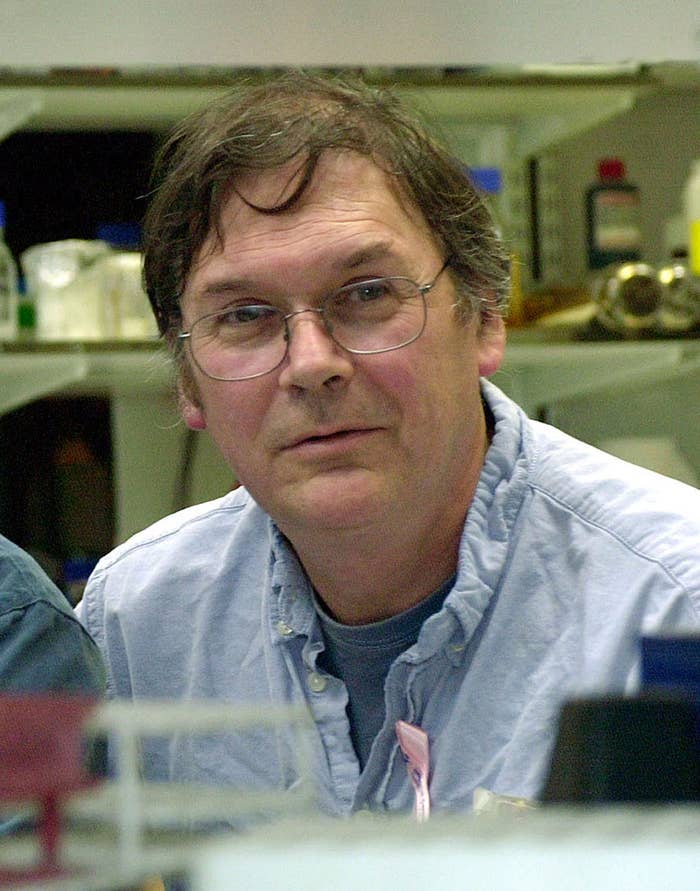British Nobel laureate Sir Tim Hunt resigned from a second post after sexist remarks he made about the "trouble with girls" in science and his support for gender-segregated labs.

In a tweet posted Friday, the European Research Council confirmed he had tendered his resignation to the European Union Commission.
Sir Tim Hunt informed @EU_Commission of his resignation as #ERC Scientific Council member.
Hunt made the remarks at a conference in Seoul, South Korea, on Monday.
On Wednesday, he resigned his teaching position at University College London.
In a statement, University College London said:
UCL can confirm that Sir Tim Hunt FRS has today resigned from his position as Honorary Professor with the UCL Faculty of Life Sciences, following comments he made about women in science at the World Conference of Science Journalists on 9 June.
UCL was the first university in England to admit women students on equal terms to men, and the university believes that this outcome is compatible with our commitment to gender equality.
Hunt told BBC Radio 4's Today on Wednesday morning that he was "really sorry that I said what I said" but also admitted he "did mean" part of his remarks, and later added he was "just trying to be honest."
Hunt made the comments at an invitation-only lunch in honour of women in science at the World Conference of Science Journalists in Seoul, South Korea, on Monday, in which he reportedly acknowledged his reputation as a chauvinist.
Nobel scientist Tim Hunt FRS @royalsociety says at Korean women lunch “I’m a chauvinist and keep ‘girls’ single lab
The 72-year-old told the audience: "Let me tell you about my trouble with girls. Three things happen when they are in the lab: you fall in love with them, they fall in love with you, and when you criticise them they cry."
However, Hunt later told BBC Radio 4 Today that it was a "very stupid thing to do in the presence of all those journalists".
He said that what was "intended as a light-hearted, ironic comment" had been "interpreted deadly seriously by my audience."
Acknowledging that he did mean elements of his remarks, the biochemist said:
"I did mean the part about having trouble with girls. It is true that I have fallen in love with people in the lab and that people in the lab have fallen in love with me. It's very disruptive to science, because it's terribly important in the lab that people are on a level playing, and I've found that these emotional entanglements have made life difficult.
I'm really really sorry that I caused any offence, that's awful. I just meant to be honest, actually."
You can listen to that portion of Hunt's apology here:
On his remarks on female scientists crying, he said: "It's terribly important that you can criticise people's ideas without criticising them and if they burst into tears, it means that you tend to hold back from getting at the absolute truth."
"Science is about nothing but getting at the truth and anything that gets in the way of that diminishes, in my experience, the science."
Connie St Louis, who runs the science journalism programme at London's City University, attended the talk in Seoul and called out Hunt on Twitter.
After Hunt's apology, she told BBC Radio 4's Today: "It wasn't funny, what he was saying, at all. What he was saying is that women should be separated from men in the laboratory".
On the same show, University College London cell biologist Dr. Jennifer Rohn added: "I think it was clear he was trying to be funny. But people will interpret his comments as having a kernel of truth underneath. And as a Nobel laureate, I know he's a human being, but he does have some sort of responsibility as a role model and as an ambassador for the profession."
Hunt won the Nobel Prize for Physiology or Medicine in 2001 for his work on cell division. He became a fellow of the Royal Society in 1991. The Royal Society said in a statement Tuesday that Hunt's comments "do not reflect" their views.
